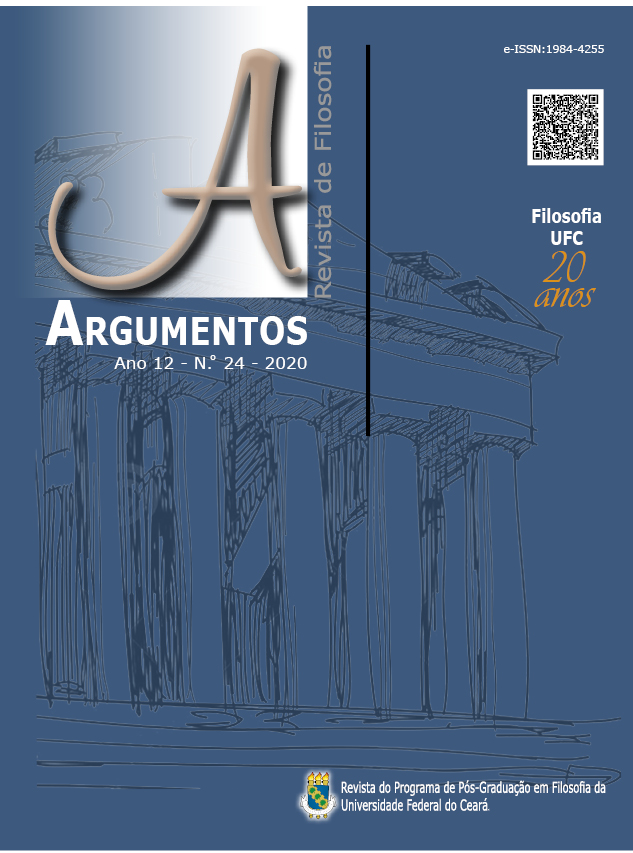Violence and teaching of Philosophy in Brazil
DOI:
https://doi.org/10.36517/Argumentos.24.2Keywords:
Teaching. Violence. Jesuit Mission. Fear.Abstract
This article contains two moments: at first, four types of violence are presented: violence for “ignorance”, social violence, state violence and philosophical violence, and the relationship with philosophy teaching in Brazil; in a second, the encounter between Europeans and Brazilian Indians is exposed, through the writings of Manuel da Nóbrega. We will see how fear was used by the Jesuits to convince Brazilian Indians to convert and, finally, we will briefly expose how the concept of voluntary slavery influenced the constitution of modern subjective law.
References
AQUINO, T. Suma Teológica. II secção da II parte – Questões 1-56. São Paulo: Loyola, 2004.
ARANTES, P. Um departamento Francês de Ultramar. Estudos sobre a formação da cultura filosófica uspiana (Uma experiência nos anos 60). São Paulo: Paz e Terra, 1994.
BARRETO, T. Estudos de Filosofia. São Paulo: Grijalbo, 1977.
BARROS, R. S. M. A significação Educativa do Romantismo Brasileiro: Gonçalves de Magalhães. São Paulo: Grijalbo, 1973.
BRANCO, J. C. Eric Weil. Limites de la démocratie. In: Revista Argumentos, n. 21, 2019, p. 249-259.
CARVALHO, L. R. A formação Filosófica de Farias Brito. São Paulo: Saraiva, 1977.
CRUZ COSTA, J. Contribuição à História das Ideais no Brasil. Rio de Janeiro: Civilização Brasileira, 1967.
EISENBERG, J. As Missões Jesuíticas e o Pensamento Político Moderno. Encontros Cultuarais, Aventuras teóricas. Belo Horizonte: UFMG, 2000.
GROTIUS, H. O Direito da Guerra e da Paz (De Jure Bell ac Pacis). Ijuí: Unijuí, 2004.
HOBBES, T. Leviathan. Londres: Penguin, 1968.
JUSTINIANO. DIGESTO. Livro I. Edição bilíngue: Latim/Português. São Paulo: Editora Revista dos Tribunais, 2000.
MARGUTTI, P. História da Filosofia do Brasil. O período Colonial (1500-1822). São Paulo: Loyola, 2013.
MARIANA, J. Del Rey y de la Institución Real. Barcelona: Deusto, 2018.
MONTAIGNE, M. Ensaios. São Paulo: Editora 34, 2016.
MONTEIRO, J. M. Negros da Terra. São Paulo: Companhia das Letras, 1994.
NÓBREGA, M. Obra Completa. São Paulo: Loyola, 2017.
QUARTIM DE MORAES, J. A justificação do tiranicídio no pensamento proto-liberal de Juan de Mariana. Campinas: Unicamp, 1993. [Primeira versão].
PRADO JUNIOR, B. Alguns Ensaios. Filosofia, Literatura e Psicanálise. São Paulo: Max Limonad, 1985.
SAHD, L. F. N. A. Grotius: A Política Proveniente do Direito Natural. In: Anor Sganzerla, Antonio José Romera Valverde, Ericson Falabretti (organizadores). O Pensamento político em movimento: ensaios de filosofia política / Curitiba: PUCPRess, 2016.
VILLEY, M. Filosofia do Direito. Definições e fins do Direito. Os meios do Direito. São Paulo: Martins Fontes, 2008.
VILLEY, M. A formação do pensamento jurídico moderno. São Paulo: Martins Fontes, 2009.
WEIL, E. Lógica da Filosofia. São Paulo: É Realizações, 2012.
WEIL, E. A Educação Enquanto Problema de Nosso Tempo. In: Hannah Arendt, Eric Weil, Bertrand Russel, Ortega y Gasset. Quatro Textos Excêntricos. Lisboa: Relógio d’Água, 2000, p. 55-70.
Downloads
Published
Issue
Section
License
Argumentos magazine is licensed under an International Creative Commons Attribution License.
The Magazine uses CC BY inclusion
1) The authors retain the copyright granted to the magazine or the right to initial publication, with the work regularly licensed under the Creative Commons Attribution, which allows the sharing of the work with acknowledgment of authorship and initial publication in this magazine.
2) The authors are authorized to contract additional applicable contracts, for non-exclusive distribution of the version of the work published in this journal (for example, publication in the institutional repository or as a chapter of the book), recognition of authorship and initial publication in this journal.
3) Authors are authorized and encourage to publish and distribute their work online (for example, in institutional repositories or on their personal pages) at any time before or during the editorial process, as they can generate productive changes, as well as increase the impact and reference of published work.




.jpg)










._._3.png)
1.jpg)
._._._.png)
